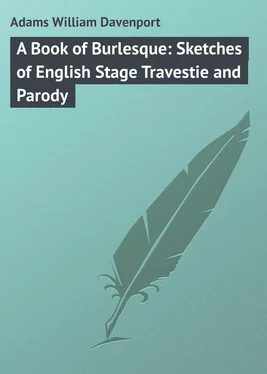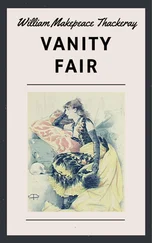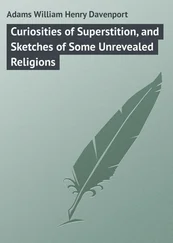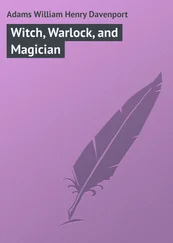Then his head aches all the next day, and he calls the children a plague and a curse,
And makes a jest of my misery, and says, "I took him for better or worse";
And if I venture to grumble, he talks, as a matter of course,
Of going to Modern Athens, and getting a Scotch divorce!
Like a base young Grecian gentleman,
One of the classic time.
"Medea," it will be remembered, was the title and subject of a burlesque by Robert Brough, brought out at the Olympic in 1856, with Robson in the title-part, Emery as Creon (King of Corinth), and Julia St. George as Jason. Medea ("the best of mothers, with a brute of a husband," as the sub-title has it) was one of Robson's most impressive rôles , being charged at more than one point (notably in the closing scene, which was played by all the characters in serious fashion) with real tragic intensity. In the lighter vein were such episodes as the duet with Jason (to the air of "Robinson Crusoe"), which I quote as illustrative of the neatness and humour with which Brough constructed such trifles: —
Medea. I have done for this man
All that tenderness can,
I have followed him half the world through, sir;
I've not seen him this year,
And the first thing I hear
Is "he's going to marry Creusa."
Going to marry Creusa,
Going to marry Creusa,
Ting a ting ting!
Ting a ting ting!
All I can say, sir, is, do , sir.
Jason. If you'll take my advice,
You'll pack up in a trice,
Nor of time to pack off be a loser;
For the popular wrath
Will be likely to froth
'Gainst a foe to myself or Creusa.
I am going to marry Creusa,
And, believe me, the best thing for you's a
Fast ship to bespeak,
And some desert isle seek,
Like a sort of she Robinson Cruiser.
Конец ознакомительного фрагмента.
Текст предоставлен ООО «ЛитРес».
Прочитайте эту книгу целиком, купив полную легальную версию на ЛитРес.
Безопасно оплатить книгу можно банковской картой Visa, MasterCard, Maestro, со счета мобильного телефона, с платежного терминала, в салоне МТС или Связной, через PayPal, WebMoney, Яндекс.Деньги, QIWI Кошелек, бонусными картами или другим удобным Вам способом.
"Tom Thumb" was performed in 1740, with Yates as the ghost and Woodward as Noodle, Glumdalca (the giantess) being represented by a man. In 1745 Yates played Grizzle, Tom being enacted by a lady. The burlesque was seen at Covent Garden in 1828.
The parts of Chrononhotonthologos, Bombardinian, Rigdum-Funnidos, Aldiborontiphoscophornio, Fadladinida, and Tatlanthe were then taken by Messrs. Murray, Shine, Soutar, Squire, Mrs. Leigh, and Miss Bella Howard respectively.
The elder Mathews was Artaxominous; Liston, Bombardinian; and Miss H. Kelly, Distaffina. A few years later Munden played Bombardinian, and Farren, Fusbos.
In the preparation of "The Happy Land" (1873) Mr. Gilbert had only a share, the scenario being his, but nearly all the writing being done by Mr. Gilbert Arthur a'Beckett.
An adaptation of John Brougham's American burlesque, "Pocohontas." Into this was introduced a travestie of the Bancroft's garden scene in "School." Mr. Lionel Brough played Captain John Smith.
In "Olympic Revels," as in some other pieces, Planché had the valuable assistance of Charles Dance.
Byron also wrote a burlesque in which Prometheus figures – "Pandora's Box," seen at the Prince of Wales's in 1866.
In 1863 and 1871.
"Orpheus in the Haymarket." An opera buffo, founded on the French of Hector Cremieux. Performed, with music by Offenbach, by David Fisher, W. Farren, Louise Keeley, Nelly Moore, and Miss H. Lindley.
Played at the Olympic in 1834.












